Walking through their new neighborhood in early January, 19-year-old Jiakuang and his mother Cui Wei noticed a group of volunteers busily preparing bags of food in the parking lot of Cornerstone Missionary Baptist Church in Bayview. Salsa, rap, and pop music blared from a speaker, and the sun beamed down on volunteers as they packed bags, broke down boxes, and handed out groceries. The pace was quick, and the bags were heavy, but the mood was decidedly upbeat.
“We live near here, and we saw them delivering the food. And we saw the [volunteers] were very tired because many people need to come here to get their food. So, we came to volunteer and help them,” said Jiakuang.
They soon came to realize that this busy bustle of activity is routine for Cornerstone on Thursday mornings; Food Bankers and volunteers start to gather at 11am, chatting while waiting for the trucks. Once the trucks arrive, everyone springs into action: staffers expertly unload pallets from the trucks and volunteers coordinate assembly lines amongst themselves, quickly sorting rice before filling bags to the brim with fresh produce like broccoli, sweet potatoes, and oranges, and proteins like chicken breast.
Meeting Their Neighbors
This Pop-up Pantry, which is hosted by Cornerstone in partnership with the Food Bank, recently began inviting participants who had time to volunteer. Every Thursday, Jiakuang, Cui Wei, and often his father 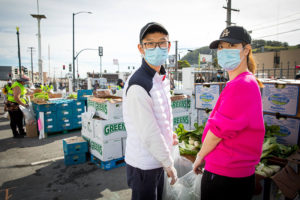 Wei Zong join other participant-volunteers in providing healthy groceries to their neighbors while also receiving food assistance themselves. For Jiakuang and his family, Thursday mornings at Cornerstone have been a time not only to receive and distribute food, but to mingle, talk, and laugh with other volunteers and food bankers.
Wei Zong join other participant-volunteers in providing healthy groceries to their neighbors while also receiving food assistance themselves. For Jiakuang and his family, Thursday mornings at Cornerstone have been a time not only to receive and distribute food, but to mingle, talk, and laugh with other volunteers and food bankers.
“We come here to make friends with others, and we tell our neighbors to come here and volunteer as well.”
Thanks to other volunteers, Jiakuang was introduced to a non-credit course at the City College of San Francisco, which he is now enrolled in. He and his family have also been learning more about their new neighborhood by chatting with other neighbors, both volunteers and food bankers. “I’m new here, so I didn’t know too much about the US. I came to the pantry, and they told me about the City College. And when we talk with each other, I can practice my English, which is the most important [to me].”
Rising Costs and Supply Chain Challenges
Jiakuang and his parents first applied to come to the US in 2008. Just as they were making plans to finally secure visas in 2020, COVID-19 hit and caused the U.S. Consulate in Guangzhou, China to close, forcing Jiakuang and his parents to delay their plans to immigrate to the US for two more years. In January 2022 they made the long-awaited trek from Guangzhou to San Francisco. While Jiakuang and his family continue looking for new jobs, the pantry has helped offset high food prices caused by inflation and supply chain issues.
“We get food here, so we don’t have to get too much from the market. This [food pantry] reduces the burden because we are new here, and food is expensive.”
Grocery prices in the Bay have increased by nearly 4% since December 2021, and the USDA predicts that prices will continue to rise throughout 2022. The chicken that Jiakuang looks forward to has been especially impacted by inflation – the price consumers are paying for poultry is predicted to rise another 4-7% in 2022. “My favorite meal is [chicken] drumsticks – my mom can make them really delicious with soy sauce and Coke.”
You Can’t Learn When You’re Hungry
For Jiakuang, an aspiring IT engineer whose current focus is preparing for the credit course in the fall, receiving food from Cornerstone gives him more time to dedicate to his studies. And he isn’t alone; as he notes, “many students are in the same situation as me.”
Evidence backs this up: a recent study found that college students were 6 times more likely to experience food insecurity during the pandemic than their fully employed counterparts.
It Takes a Community
We know that healthy food is essential to student success, both in and outside of school. But we can’t underestimate the value of a healthy community. The participants, volunteers, and pop-up staff at Cornerstone all play a critical role in communicating, listening to, and meeting the needs of the neighborhood; it’s this kind of collaboration that is so vital towards building a hunger-free community.
For Jiakuang, volunteering alongside his new neighbors means being part of the solution.
“I think it’s meaningful. I wish more people would come here to volunteer because many people need to get food, and they can also contribute to the Food Bank.”



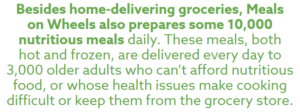
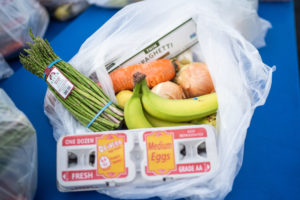 Partners like Meals on Wheels, as well as our own
Partners like Meals on Wheels, as well as our own 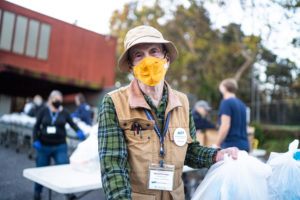
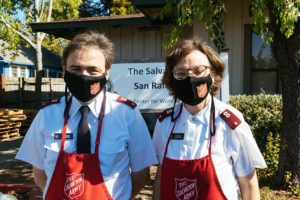 Soup. Soap. And Salvation. Since 1865, The Salvation Army has taken a holistic approach to serve those with the greatest need in our community. According to Diane Shatto, a Lieutenant and ordained minister at San Rafael’s branch of The Salvation Army, you can’t nourish people’s spirits until you nourish them with food. “That’s why our food pantry and home-delivered groceries are key activities for us.”
Soup. Soap. And Salvation. Since 1865, The Salvation Army has taken a holistic approach to serve those with the greatest need in our community. According to Diane Shatto, a Lieutenant and ordained minister at San Rafael’s branch of The Salvation Army, you can’t nourish people’s spirits until you nourish them with food. “That’s why our food pantry and home-delivered groceries are key activities for us.”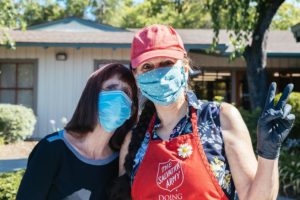 Carol Gotti has been volunteering with the Salvation Army’s food program for over ten years, and the participants are a lot more to her than names and numbers. “I’ve gotten to know about people’s lives, and you get a feeling about the things that bring people joy,” she said.
Carol Gotti has been volunteering with the Salvation Army’s food program for over ten years, and the participants are a lot more to her than names and numbers. “I’ve gotten to know about people’s lives, and you get a feeling about the things that bring people joy,” she said. 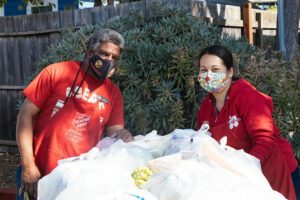 “I was the second youngest of five children with three older brothers who were always more aggressive than me about grabbing the food at dinnertime. I had hunger pains all the time, and other kids at school would make fun of me because I was skinny. It makes you feel inferior, you lose motivation, and you lose hope. And that’s how the cycle of poverty continues.”
“I was the second youngest of five children with three older brothers who were always more aggressive than me about grabbing the food at dinnertime. I had hunger pains all the time, and other kids at school would make fun of me because I was skinny. It makes you feel inferior, you lose motivation, and you lose hope. And that’s how the cycle of poverty continues.”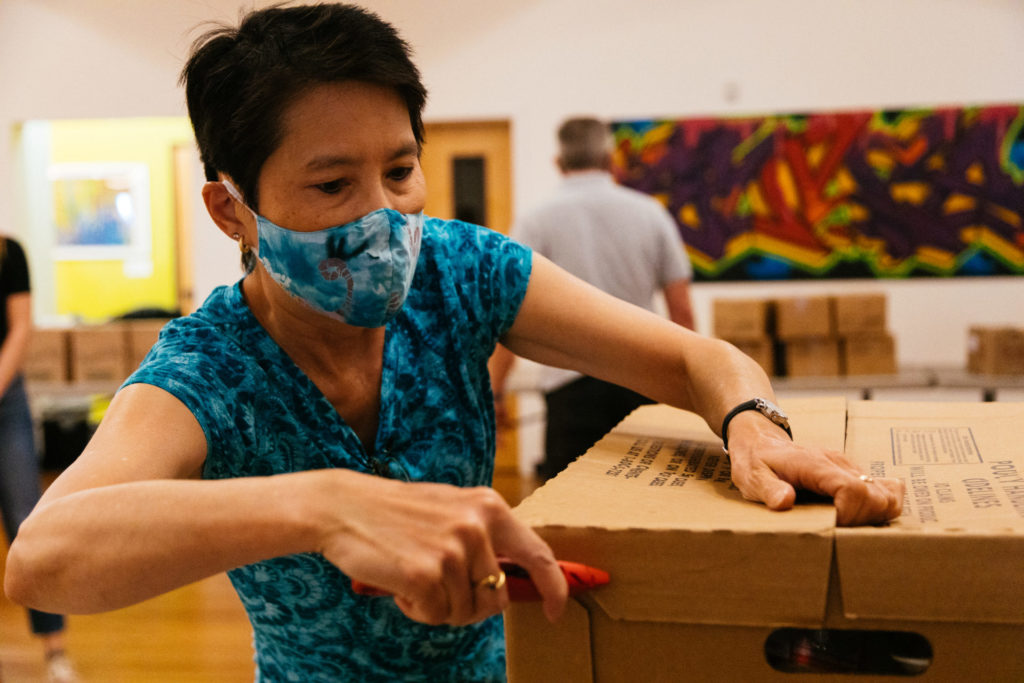
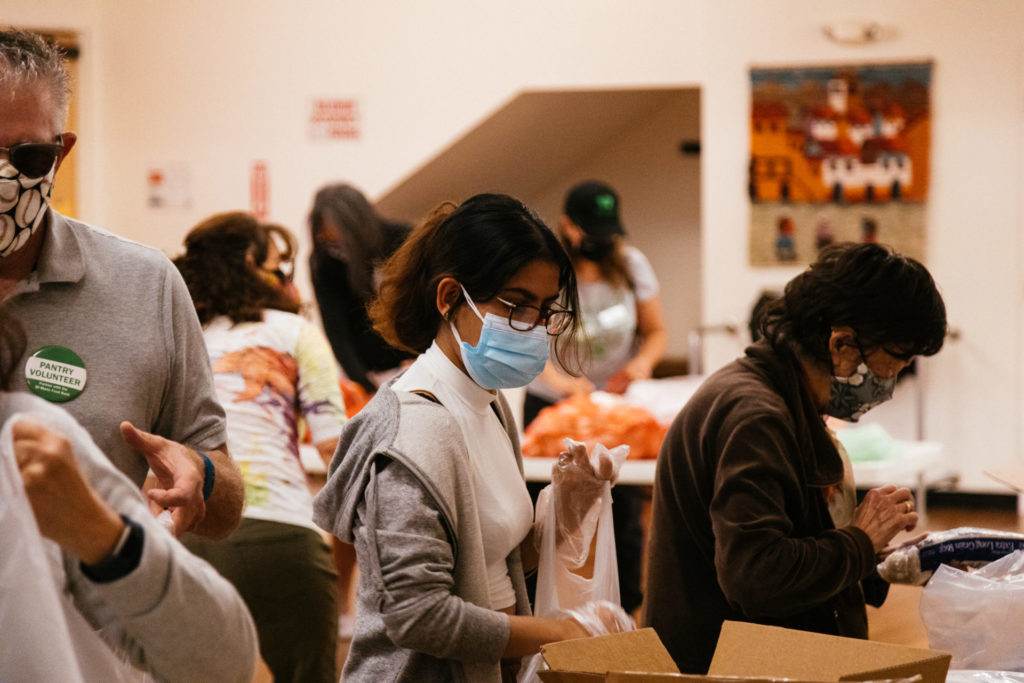
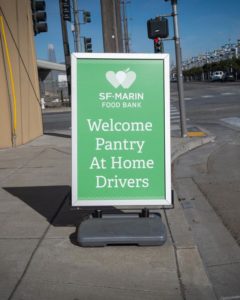 In September the Food Bank approached several regular
In September the Food Bank approached several regular 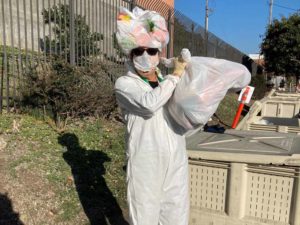 For Patricia, the greatest reward was getting to know people. “Rather than just going up to a house and you don’t ever see them again, you see the same people every week. It’s a really nice way to develop a relationship,” she said.
For Patricia, the greatest reward was getting to know people. “Rather than just going up to a house and you don’t ever see them again, you see the same people every week. It’s a really nice way to develop a relationship,” she said.
Share